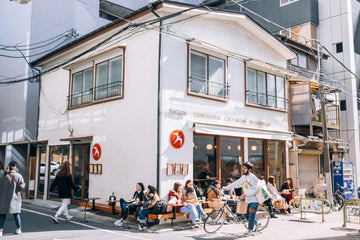FUGLEN Coffee DRIP BAG / AA KII, KENYA
This coffee has fruity aromas of Kenyan red currants and berries, but also has a soft impression similar to black tea and a calm, sweet finish.
This drip filter bag is made with the amount of powder that can fit into the bag in mind.
A regular drip bag usually weighs 12 grams, but we put 14 grams of coffee grounds into a slightly larger bag. This size allows you to brew a lot in one cup.
The recommended amount of hot water is 200~230ml.
Nitrogen-filled packaging to preserve the freshly ground flavor for as long as possible.
Try it when you are traveling or want to enjoy delicious coffee easily☕️
In late February this year, we also visited suppliers in Kenya and conducted cupping procurement. I've had the opportunity to encounter a lot of coffee this year and taste hundreds of cups.
The visit comes in the wake of changes to Kenyan coffee distribution rules, with those in the supply chain anxiously but hopefully trying to adapt to the new rules. In this case, we focus on finding high-quality coffee.
When we visited Kenya in late February, it was the peak season for harvesting and refining major crops. Every year I find Kii Factory's coffee to be of high quality, but this year's cupping was particularly eye-catching.
The coffee is produced at the Kii factory, part of the Rungeto farmers' cooperative in central Kenya. Kii is one of three wet mills managed by Rungeto FCS in Kirinyaga and is Fairtrade certified.
Runget FCS was formed by the merger of three factories, Kiangoi, Karimikui and Kii. The union president implemented quality-oriented processes in all Runget FCS plants. For example, we installed ceramic tiles in all wash lanes and fermentation tanks. Additionally, water used during processing is recycled. Runget FCS farmers grow crops on the slopes of Mount Kenya, a region known for producing rich, complex and delicious coffee.
Most Kenyan coffee is processed using the washed method. The coffee cherries are carefully hand-picked and delivered directly to the wet grinder or collection point. There, they are transferred to sorting mats or tables to remove unripe or damaged cherries. Afterwards, the weight is measured and processed by washing and refining.
First, place the coffee cherries in the jar and remove the unripe cherries floating on top. Next, use a disc pulper to remove the pulp, leaving behind the parchment that protects the green coffee beans. After the pulp is removed, the beans are sorted by weight using water to separate high-quality, dense beans from light, low-quality beans.
Then, an overnight dry fermentation breaks down the sugar (gooey) that clings to the surface of the parchment and washes it away. Canals are then used to further sort the coffee beans (heavier beans that sink to the bottom of the canal are considered taller and sweeter). Then soak in water for 24 hours. This process is said to enhance the proteins and amino acids in the coffee beans, thereby adding acidity complexity and clarity in the cup.
After steeping, the coffee is spread out on a raised drying rack (also called an african bed) and stirred constantly to ensure even drying. During this process, any defective coffee beans are identified and removed. Time on the drying bench varies depending on climate, ambient temperature and throughput and may take 1-3 weeks to reach the target moisture content of 11-12%.
Farmers are free to choose which factory to send their cherries to, as there are often multiple options in their area. In Kenya's traditional auction system, quality is of paramount importance, and the higher the quality of coffee, the higher the price. Factories producing high-quality coffee attract more farmers because they often receive up to 90% of the sales price as a second payment after marketing and preparation costs.
Transparency is a key feature of the Kenyan system, with everything clearly divided into batches and grades. Farmers know exactly what portion of the sales price, after processing costs, is returned to the cooperative. Many cooperatives and factories compete to provide farmers with the best returns, with some able to reimburse up to 90% of the sales price.
- Taste: Red currant, Barbados cherry, juice, Assam tea,
- Variety: SL28,SL34,Ruiru-11,Batian
- Process: Washed
- Country: Kenya
- Altitude: 1,600-1,800m
- Farm: Kii Factory
- Roast: light roast
- Baking place: Japan
- Best before date:
- Material: 100% coffee beans
- Weight: 14g x 5 pack
Pickup currently unavailable

About Fuglen Coffee


